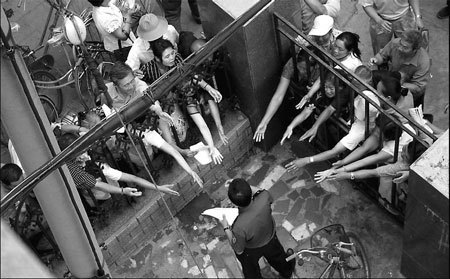Channels for public feedback remain inadequate despite government efforts in recent years to solicit more views on the ground, a survey has shown.
From hotlines run by mayoral offices to governors' e-mail addresses and online complaint centers, nearly 70 percent of 7,111 online users polled in a weeklong survey conducted by the People's Daily website said they had no idea of such channels for public opinion, while 96.8 percent of respondents said these available channels were ineffective.
 |
|
Residents in Heping district of Shenyang, Liaoning Province, reach out in this file photo for queue sheets at the Shenyang Public Security Bureau to meet its director. A recent People's Daily survey has shown channels for public opinion remain inadequate. [China Daily] |
The results of the survey, released yesterday, also showed lack of response from government departments and the passing of responsibility to other parties as major problems in collecting public opinion.
Only 3.2 per cent of those polled said they received timely response on their feedback and felt happy about the channels for public opinion, the survey showed.
The rest of those polled have disappointing experiences - 6.5 percent said the response from government was too slow, while more than half of respondents said it was "very hard" to get through the hotlines and e-mails were usually ignored.
"The response from the online users reflects the real situation," Shen Ronghua, a researcher in public administration, told China Daily yesterday.
"I have tried the mayor's hotline in Beijing and it was always busy," Shen said.
Setting up such a hotline is a good way for officials to be aware of the public's concerns, but a hotline or an e-mail inbox is not enough, he said.
"After all, the mayor has limited time and energy, and cannot take care of all the issues," Shen said.
"Every functional department should have its own channel to deal with public complaints or suggestions."
The survey shows current channels for public opinion to be flawed and huge efforts to build e-government - the use of the Internet to carry out government services - have failed to serve the public effectively, said Guo Weiqing, a professor of public administration at Guangzhou's Sun Yat-sen University.
"The government has invested a lot to promote e-government," Guo told China Daily.
"But such efforts have failed if most people do not know of the public opinion channels."
Since 1999, the authorities have encouraged local governments to set up official websites to better serve the public. In 2002, the State Council decided to pump in 1 trillion yuan (US$146 billion) to boost infrastructure in information services in five years.
By the end of last year, about 500 local governments have signed e-government contracts with China Telecom, the major State-owned telecom operator said.
The country spent 50 billion yuan on e-government services in 2005, with the figure hitting 60 billion yuan in 2006, a report by the Chinese Academy of Social Sciences showed.
People's Daily itself put up public opinion channels in 31 provinces, municipalities and autonomous regions, with all hosting official websites.
"We should seriously doubt the feasibility of those websites," Guo Weiqing from Sun Yat-sen University said.
"The websites are only the tools the most important thing is the mentality of government officials and whether they are willing and prepared to communicate with the public," he said.
Another public administration researcher said conventional government structures and administrative mechanisms should be used to smooth out public opinion channels.
"The government needs a new mechanism to face public opinion," Liu Qinglong, a professor with the School of Public Policy and Management in Tsinghua University, told China Daily.
Most local governments currently do not have effective procedures to deal with public opinion, while a number of them, such as those of Beijing and Shenzhen, have been trying their own ways to strengthen public communication, Liu said.
"But it is not realistic to expect such government reforms to be completed in the short term," Liu said.
(China Daily January 6, 2009)